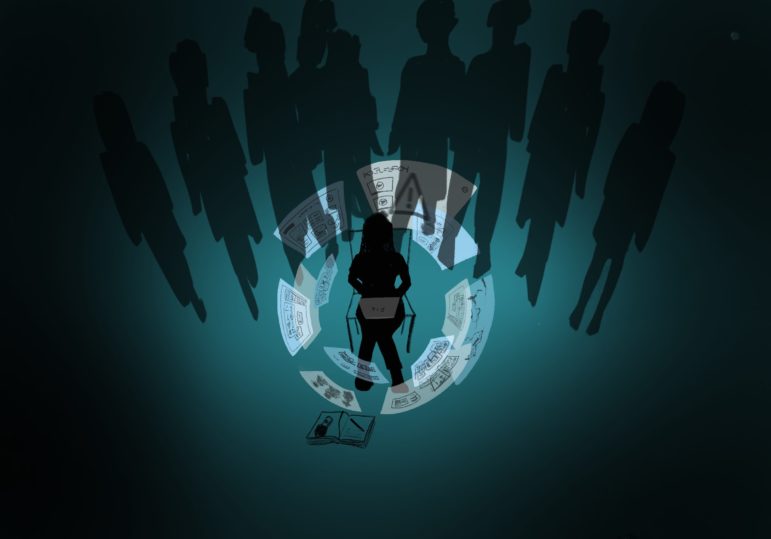

The helpline was set up to help staff and freelance reporters, and is staffed by fellow journalists who understand the difficulties of the news industry. Image: Shutterstock
Inside ‘Projekt Helpline’: Germany’s Mental Health Phoneline for Journalists
Investigative journalism is a stressful vocation — even when operating in a country with robust press freedom laws.
Journalist associations and press freedom organizations around the world offer some resources, legal aid, and funding for emergencies, and there is a growing — though by no means exhaustive — list of options for trauma- and mental health-focused support. But a dedicated telephone helpline to help journalists with work-related mental health issues has advanced the cause of addressing the specific challenges that media professionals face.
When the Dart Centre Europe and Netzwerk Recherche, the German Association of Investigative Journalists, started collaborating in 2021 to set up a helpline for journalists based in Germany, they were venturing into uncharted territory, clinically speaking.
Veteran investigative reporter, filmmaker, and trainer Juliana Ruhfus, then director of the Dart Centre Europe, recalls that a UK-based clinician who helped them with a literature review “found that there was next to no literature on helplines for journalists, and that anything we could learn from such a helpline would be an important knowledge contribution in the field.”
After about 18 months of research, training, and fundraising, the Netzwerk Recherche Helpline launched in November 2023 for journalists facing mental health issues. It’s independent, anonymous, and free, and is for both staff and freelance journalists, who often lack access to the in-house mental health resources of larger media organizations. It’s for all media production professionals, from reporters to camera operators, editors, and sound technicians. The helpline is staffed by fellow journalists — volunteer “peer supporters” trained in psychological first aid.
Callers do not need to be Netzwerk Recherche members, but it is only available for journalists living in Germany. In March 2025, they launched an English-language service.
Malte Werner, the helpline’s project manager, says that has helped them connect with the many exiled journalists now based in Germany.
RSF (Reporters Without Borders) notes that many of the reporters seeking sanctuary in the country have fled persecution or threats in Turkey, Iran, and the Maghreb region (central and western North Africa,) and in recent years others have also come from Hungary, Poland, and Ukraine.
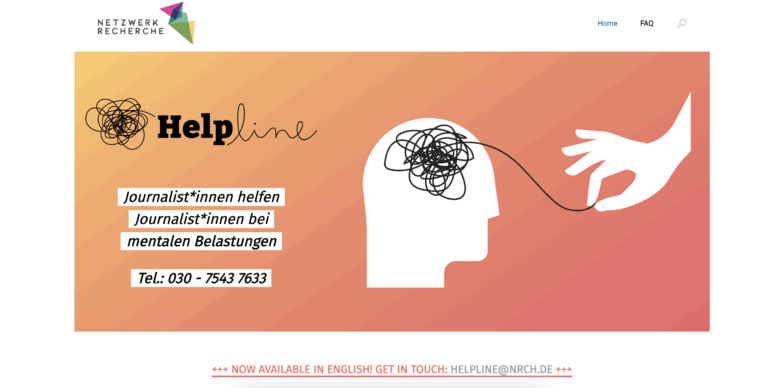
‘Journalists Help Journalists’
The service’s strapline is “Journalists help journalists with mental health,” and the peer element is key, explained Ruhfus. “The helpline came out of the desire to develop a peer support project that would train journalists to support other journalists in the wake of the pandemic, in a climate of increasing hate speech, the war in the Ukraine, and the rapidly growing conversation about the need for mental health support — to which we wanted to respond in a practical way.”
The helpline sought to fill a gap in mental health resources and to address the compounded sources of stress during a perilous time for journalists everywhere — even in Germany, which has robust press laws, but where media workers still face unprecedented job insecurity and attacks from the far-right.
But they also hope to shift cultural attitudes towards mental health in a profession long accused of celebrating an outdated culture of toughness, where seeking professional help is seen as a weakness.
“Many are still trapped in this old image that journalists are all tough guys,” said Werner. “It’s not just about the fact that one can come back traumatized as a war reporter. This also extends to the photo desk or the verification department. Everyone comes into contact with distressing material and can also carry trauma from that,” he added. “It’s also about the pressure, because positions are being cut and now fewer people have to do more work.”

“The discussion about how to respond to the unprecedented levels of stress, threats, and exposure to ever-increasing traumatic content is ongoing,” says Juliana Ruhfus, pictured here at one of the mental health roundtables the team held with German journalists. Image: © SWR/ Patricia Neligan
The helpline handles diverse call subjects, but “what we have seen is that occupational stress is the biggest issue in the calls,” said Werner. “Personal stress is also a major topic, because these two are often interconnected.”
Anxiety and fear are also common subjects. “It can be fear of losing a job, or fear of being assaulted during protests,” said Werner. The helpline is not a substitute for therapy; as peer supporters, they are not trained to diagnose. While sometimes all someone needs is to talk, the volunteers have been trained to advise callers about next steps if necessary. “For example, we can identify signs that someone might be at risk of burnout, or that they sound like they might be suffering from depression, and can recommend further help,” said Werner.
The helpline currently receives about one call per week on average — but the amount can vary from several calls a week to none.
Setting Up the Helpline Projekt
Ruhfus describes the helpline as a “wonderful collaboration.” The Dart Centre Europe – which is soon to become the European Centre for Journalism and Trauma – “brought the subject matter expertise and relationships with experts and clinical psychologists; Netzwerk Recherche provided the media industry contacts.
Ruhfus and the Dart Center’s Germany-based project manager Jeanny Gering approached Netzwerk Recherche in the summer of 2021. “They asked whether we were interested in advancing the topic of mental health in journalism in a more structured way,” said Werner. “We thought for about a year and a half about how to set it up, and especially how to finance it. Then the idea emerged that we could provide a lot of mental support through telephone counseling.”

Malte Werner at one of the round tables on mental health in journalism held at Germany’s public broadcaster SWR earlier this year. © SWR/Patricia Neligan
Part of the long preparation included a series of discussions with industry professionals in Germany. “As part of the Helpline Projekt, we organized a series of seven roundtables with broadcasters, radio, and national and regional newspapers across Germany,” said Ruhfus. “The goal was to get a snapshot of what the challenges are, the range of responses — both on a peer level and also from management — and also the ongoing needs.”
Fundraising was a challenge, explained Werner. After an initial goal of getting small donations from many funders, they secured “a handful” of supporters, including Der Spiegel, Süddeutsche Zeitung, the Friedrich-Ebert-Stiftung, and the German journalists’ union DJV, among others, and were able to raise enough money for a six-month trial of the helpline.
“During this testing phase, we were able to find a funding program and successfully apply for it with the federal government. We then received money from them for two years, not only to keep the hotline running, but also to further research the topic in collaboration with a university.”
However, the funding is set to run out next year, if not sooner. “We have spent slightly less money than we had applied for, which means we hope to extend the project through a new application,” said Werner. “We will not receive more money, but we can still spend the remaining funds until 2026, so the helpline can exist a little longer. After that, we will have to look into how to obtain new funding for the project.”
The helpline is currently staffed by 11 volunteers — all professional journalists — who work shifts around their jobs. They received intensive training workshops that combined counseling techniques, such as active listening and helpful communication strategies, with training on specific stress and risk factors for journalists.
The workshop was interactive and took place over several days, explained clinician Friederike Engst, a psychological psychotherapist based in Dresden who led the training. Engst and the peers worked together to link their own professional experience and expertise to the training content.
“It was about discovering one’s own motives for becoming a peer, the skills they bring, and when participants would have wished for [in] a helpline for themselves,” she explained. “Furthermore, it was important to clarify roles. What are the tasks of a peer and peer support, and where are the boundaries? For example, which resources to refer people to, and how to provide counseling and support, but no therapy and no diagnosis.”
Engst added: “With the expansion to English-language offerings, topics of journalism in exile also become important, which we have already addressed and want to explore further.”
Lessons Learned
In the almost two years it has been operational, the work on the helpline has brought some insight into what kind of support journalists most need — and some knowledge to contribute to the growing field of mental health care for media professionals.
“The discussion about how to respond to the unprecedented levels of stress, threats, and exposure to ever-increasing traumatic content is ongoing,” said Ruhfus. The roundtable discussions taught them that “the single most-named factor causing high levels of stress was digitalization and the change away from traditional, slower news cycles towards non-stop news at the same time as jobs are being cut and there is more breaking news to report,” Ruhfus noted. “And of course we also heard about threats to journalists, doxxing, an increasing exposure to graphic and traumatic content, and a wider loss of purpose.”
Said Ruhfus: “A really big takeaway for us is how important it is to have editors and newsroom managers who are trained to provide their staff with role clarity, can create a supportive team culture, and keep an open ear for people’s problems.”
Note: Callers in Germany who want to speak to somebody in English should get in touch by email, so the helpline can connect them with English-speaking peer supporters. German call times are listed on the NR website.
 Alexa van Sickle is a journalist and editor with experience across digital and print journalism, publishing, and international think tanks and nonprofits. Before joining GIJN, she was senior editor and podcast producer for the award-winning foreign correspondence and travel magazine, Roads & Kingdoms.
Alexa van Sickle is a journalist and editor with experience across digital and print journalism, publishing, and international think tanks and nonprofits. Before joining GIJN, she was senior editor and podcast producer for the award-winning foreign correspondence and travel magazine, Roads & Kingdoms.


